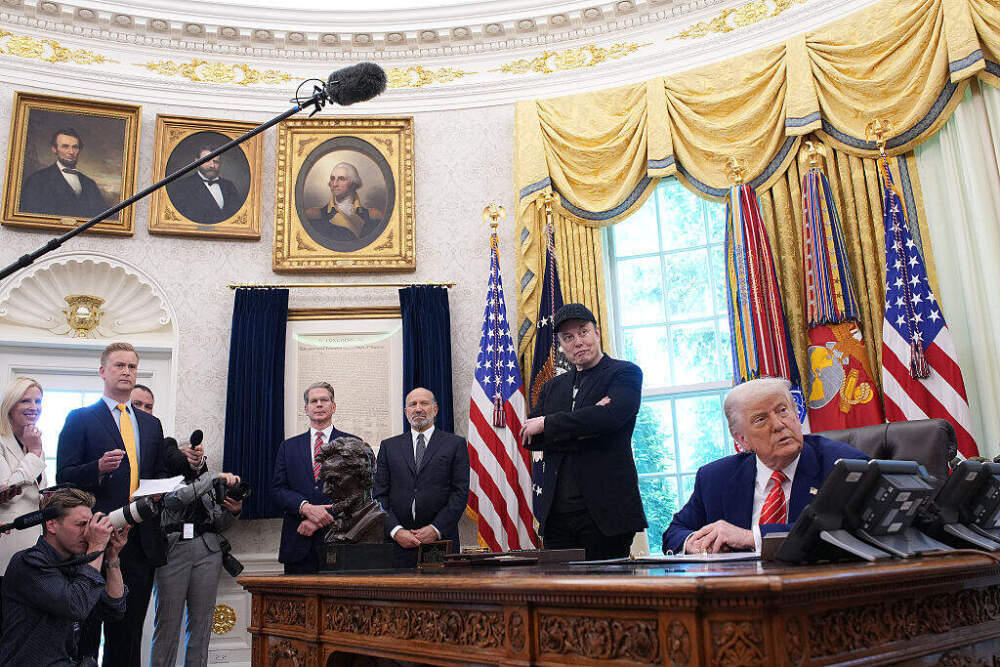Advertisement
The Firehose
Trump weaponizes words. His opponents should, too

Last week, the House of Representatives passed a massive bill that, according to the nonpartisan Congressional Budget Office (CBO), slashes nearly $700 billion from Medicaid and $267 billion from food stamps, among other things, over 10 years. It also hands the top 0.1% of earners nearly $400,000 more per year. The CBO calculates that the bill would increase the deficit by $3.8 trillion over the next 10 years. The Republican-led Senate is now considering its version of the bill.
None of this should come as a surprise. It’s precisely what candidate Trump promised the gilded donors who underwrote his campaign. Nor is it a surprise that Trump dubbed this malignant money grab as a “big beautiful bill.”
What is shocking is that the mainstream media is still parroting his language — even after eight years of Trump’s fraudulent marketing tactics.
Media outlet after media outlet trotted out his pet phrase. Some put the phrase in scare quotes, but even they were furthering the president’s branding efforts.
The spending bill is the most recent example of a pattern identified by linguist George Lakoff, in which the press serves as an unwitting “marketing agency” for Trump by repeating his language, even when refuting his claims.
Of course, Turmp isn't the first Republican to use this tactic. For decades, conservative pundits and pols have engaged in linguistic warfare, distorting our civic discourse through repetition and hyperbole.
This is how an obscure provision about end-of-life care in the Affordable Care Act wound up spurring a moral panic about “death panels.” It's why the Trump administration and its allies use phrases such as "illegal alien" rather than "undocumented immigant" and "radical indoctrination" rather than "public school education."
Trump, with his brazen salesmanship, has expanded the right-wing media echo chamber into an inescapable thunder dome, deploying slogans to brand his aspirations (“drain the swamp,” “build the wall”), smear his enemies (“Crooked Hillary,” “Sleepy Joe,” “deep state”) and inoculate himself from accountability (“fake news,” “witch hunt”).
Journalists insist that they have an obligation to report the words of our commander in chief (see this piece from NPR and this one from the New York Times, for instance). So Trump has energetically exploited his bully pulpit by using words that distort the truth and incite violence.
Advertisement
For those who oppose the Trump regime, the strategy should also be obvious: fight language with language.
The spending bill is the most recent example of a pattern identified by linguist George Lakoff, in which the press serves as an unwitting “marketing agency” for Trump by repeating his language, even when refuting his claims.
Step one is for the left to get organized when it comes to their own branding. Democratic and progressive leaders need to settle on sticky slogans and use them relentlessly — in media appearances, congressional hearings, rallies and press conferences.
Trump’s budget bill (for instance) could become the “big, beautiful boondoggle.”
Why? Because this phrase establishes a linguistic frame that identifies the legislation for what it might be: the largest transfer of wealth from poor people to rich people in American history.
Trump himself could be called “Tariff Trump,” to remind Americans that Trump — and Trump alone — is the person to blame for the economic pain inflicted by his tariffs.
The rising cost of goods and services caused by “Tariff Trump” could be called “Trumpflation.” Not once or twice, but in every single public appearance.
In the context of foreign policy, Trump, who pledged a quick resolution to the wars in Ukraine and Gaza, and has delivered neither, could be referred to as “No-deal Donald.”
His broader agenda could be referred to as “flopulism.” This phrase would allow his opponents to describe the elements of his failed populism: the broken promises to American veterans, workers and farmers, the sweetheart deals for tech moguls and sheiks.
Americans were treated to a splendid example of how the president’s opponents might use language to expose his feckless policies last week, when a reporter asked Trump about the acronym “TACO,” which stands for “Trump always chickens out.” It’s a term coined by Financial Times columnist Robert Armstrong, that financial analysts now use to describe Trump’s constant waffling on tariffs.
Not surprisingly, it sent the insecure Trump into an aria of defensive rage.
Democrats should be using the term non-stop. Heck, they should have 1,000 tacos Door Dashed to the Oval Office.

Then, taking a page from conservatives who intentionally mispronounce names and misuse misuse labels as a form of insinuation, Trump’s opponents could pronounce the acronym for the so-called Department of Government Efficiency, or DOGE, as “dodge.”
Why? Because it reinforces the notion that this entity represents one giant dodge. It is the Trump administration’s effort to dodge oversight and accountability, even as Elon Musk fires tens of thousands of federal workers and accesses the data of millions of American citizens.
Does this kind of wordplay sound a bit hokey? Yup. Does repeating idioms ad nauseum feel gimmicky and even condescending? Sure.
But as Trump and his allies have demonstrated, in an era of agitated distraction, Americans latch on to simple catchphrases as a way of grasping complex realities.
I honestly believe that the majority of Americans do not want a government that coddles the rich and scapegoats the powerless (refugees, students, the poor). What they’re waiting for are political leaders who can speak to the moral urgency of the moment, who can inspire them to stay engaged rather than giving up and tuning out.
The sooner Trump’s opponents recognize this, the better because they are at a structural disadvantage.
Journalists are never going to coin partisan slogans the way right-wing propagandists do. But the mainstream media will continue to echo those phrases used by political leaders. If leaders on the left want to stop Trump, they need to deploy the kind of piercing, precise language that can strip away his distortions and reveal the cruelty of his aims.
Follow Cog on Facebook and Instagram. And sign up for our newsletter, sent on Sundays. We share stories that remind you we're all part of something bigger.
